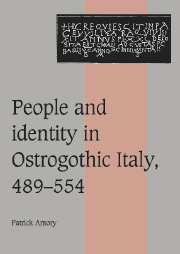Book contents
- Frontmatter
- Contents
- Preface
- List of rulers
- Terminology and vocabulary
- List of abbreviations
- Map of Ostrogothic Italy
- Introduction: Studying the barbarians in late antiquity
- 1 Ethnicity, ethnography and community in the fifth and sixth centuries
- 2 The Ravenna government and ethnographic ideology: from civilitas to bellicositas
- 3 Individual reactions to ideology I: names, language and profession
- 4 Complementary and competing ideals of community: Italy and the Roman Empire
- 5 Individual reactions to ideology II: soldiers, civilians and political allegiance
- 6 Catholic communities and Christian Empire
- 7 Individual reactions to ideology III: Catholics and Arians
- 8 The origin of the Goths and Balkan military culture
- Conclusion
- Appendix 1 The inquiry into Gundila's property: a translation and chronology
- Appendix 2 The Germanic culture construct
- Appendix 3 Archeological and toponymic research on Ostrogothic Italy
- Appendix 4 Dress, hairstyle and military customs
- Prosopographical Appendix: A prosopography of Goths in Italy, 489–554
- Bibliography
- Index
- Cambridge Studies in Medieval Life and Thought Fourth Series
3 - Individual reactions to ideology I: names, language and profession
Published online by Cambridge University Press: 03 December 2009
- Frontmatter
- Contents
- Preface
- List of rulers
- Terminology and vocabulary
- List of abbreviations
- Map of Ostrogothic Italy
- Introduction: Studying the barbarians in late antiquity
- 1 Ethnicity, ethnography and community in the fifth and sixth centuries
- 2 The Ravenna government and ethnographic ideology: from civilitas to bellicositas
- 3 Individual reactions to ideology I: names, language and profession
- 4 Complementary and competing ideals of community: Italy and the Roman Empire
- 5 Individual reactions to ideology II: soldiers, civilians and political allegiance
- 6 Catholic communities and Christian Empire
- 7 Individual reactions to ideology III: Catholics and Arians
- 8 The origin of the Goths and Balkan military culture
- Conclusion
- Appendix 1 The inquiry into Gundila's property: a translation and chronology
- Appendix 2 The Germanic culture construct
- Appendix 3 Archeological and toponymic research on Ostrogothic Italy
- Appendix 4 Dress, hairstyle and military customs
- Prosopographical Appendix: A prosopography of Goths in Italy, 489–554
- Bibliography
- Index
- Cambridge Studies in Medieval Life and Thought Fourth Series
Summary
It is not easy to analyze individual responses to the label “Goth” since no one outside the royal families and the Arian church hierarchy ever declares himself or herself a Goth in the surviving sources. An alternative method is to assemble all the attested individuals who fall into one of the criteria of identity outlined by the various ideological descriptions of the Goths. I have done this in the Prosopographical Appendix (PA).
Quantitative analysis of the 379 individuals in the PA is not possible in most categories. Half of the individuals listed are attested only by either Cassiodorus or Procopius. Aside from the problems of the bias of these sources (they propagate governmental ideologies), each tends to turn up specific types of people. Cassiodorus reveals Latin-speaking soldiers with Germanic names; we do not know their religion. Procopius reveals soldiers whom he calls Goths, with Germanic names, fighting on the Gothic side; we do not know their religion or their language. Neither source tells us much about spouses or family. We learn about spouses and family from people in inscriptions and papyri, but little about profession.
Nevertheless, one generalization emerges. The survey shows an enormous number of certain Latin-speakers, a group including every attested Gothic-speaker. Granted, they are attested in Latin sources, but the complete absence of reference to interpreters and the very small number of references to a Gothic language shows that communication was not a problem.
- Type
- Chapter
- Information
- People and Identity in Ostrogothic Italy, 489–554 , pp. 86 - 108Publisher: Cambridge University PressPrint publication year: 1997



